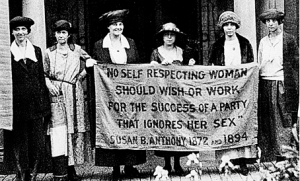By: Rifath Islam
“The emotional, sexual, and psychological stereotyping of females begins when the doctor says, ‘It’s a girl.’” (Shirley Chisholm)
Reflecting on this quote, I wonder why it is that when children are born, they get a gender-specific color assigned to their clothing, toys and feeding bottles. Girls essentially get pink and boys get blue. Stereotyping of what it means to be a girl begins at a very young age and although parents may not know it, setting up a baby girl’s nursery with pink wallpaper, frilly dresses, and tea sets is assigning a gender role that perpetuates oppressive expectations.
We can agree that times have changed and yes, girls and women have too. Their “roles” in society have changed as well, but how much? Not too long ago, it was believed that women were to stay home and be housewives, meaning that they would cook, clean and dote on their husbands. The husbands were believed to be the only ones who should have jobs. Today women do have jobs; not everyone is a stay at home mom anymore. However, gender roles have been assigned again with the types of jobs that women are “supposed” to have.
We see stereotyping everywhere we go. On average, women around the world earn 24% less than men. Stereotypes are forced upon young girls at a young age by organizations such as Disney. Though it may not seem like it, the plot to almost every Disney princess movie out there is a damsel in distress who’s vulnerable and needs her knight in shining armor to come save her. Although Disney movies are evolving slowly, we’ve still a got a long way to go.
Generally, when people think of the term “girl,” they think of people who have pretty hair and dress “girly.” But what does that actually mean? The actual definition of the term is “a female child.” Not once do the ideas of “pretty hair” and “feminine clothing” come up in the actual definition. Not only does this affect society, but it affects what girls think of themselves as well.
In a campaign ad done by the Always company, girls who had and hadn’t hit puberty were asked to come in and imitate actions “like a girl.” Girls who had already hit puberty were asked to “hit like a girl,” “run like a girl” and “throw like a girl.” These girls had imitated a feeble attempt at hitting, throwing and running. However, the girls who hadn’t yet hit puberty did the exact opposite and were fierce when it came to imitating these actions.
What does this tell you about society? It shows us that these stereotypes are not only limiting women and girls, but destroying their self-esteem. It’s about time that we all step up to take a stand against this so that everyone gets the equality that they deserve.

